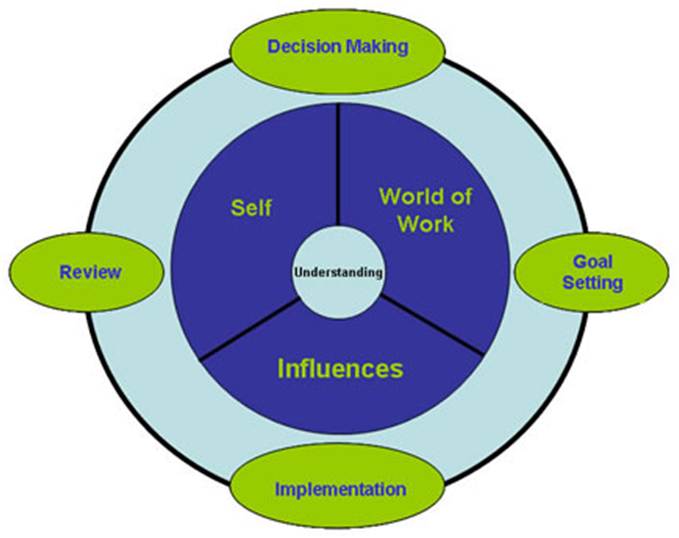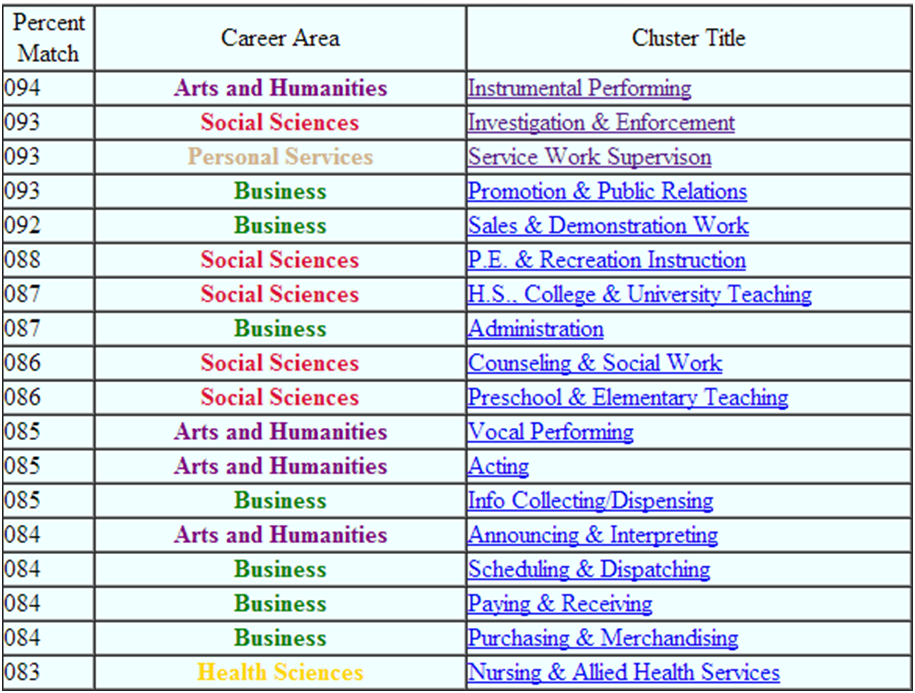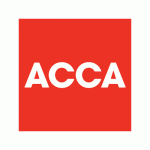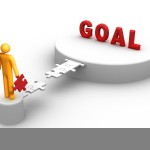Personal reflection & development

People who plan their career years in advance and make efforts to make them happen achieve far more than those who do not have a long-term plan and make their career decisions dictated only by immediate benefits. It’s better to be proactive for an individual to assess his interests, strengths, weaknesses and realistically evaluate his options and make relevant plans, rather than being reactive and end up in an employment where the individual’s true potentials are not realised for many different reasons. This article illustrates my personal career plan in detail in my chosen field of professional interest – marketing, and lists steps I am planning to undertake to progress to my dream job, anticipating possible challenges, analysing alternative progressions and describing preventive actions. The article also describes career planning methodology, marketing field in general and necessary KSAs to be successful in this field. My personal development plan is provided in the article along with my SMART objectives describing how I am planning to prepare myself for each step which eventually will lead me to my dream job – marketing executive. Dream Job – Marketing Executive Marketing executives promote products, services or ideas by developing marketing strategies and campaigns. They are closely involved in public relations, planning, research, product development, participating in events and organising them. This role is fascinating to me because it provides two job elements which I find exciting: meeting and communicating with people, and seeing the immediate and long-term results of your work. Marketing executives have a wide range of responsibilities and it depends mainly on the sector and the size of the company. The job of a marketing executive includes production of marketing materials, managing the marketing budget, organizing and attending to events, exhibitions etc., evaluating the efficiency of marketing campaigns, conducting market research, and…
By John Dudovskiy
Category: Personal reflection & development

Completing the Marketing Design and Innovation module and report has been a great learning opportunity for me in many levels. Thanks to this module I obtained an in-depth knowledge about the main features of product and service design from marketing viewpoint, in both theoretical, as well as, practical levels. The contents of the module and an effective teaching style of the tutor have played an instrumental role in assisting me to distinguish between the key characteristics of the designing process within the settings of ever-changing consumer taste and highly dynamic nature of style. Moreover, Marketing Design and Innovation module has taught me the importance of patenting ideas, registering designs, and safeguarding own intellectual property in a timely and appropriate manner. Also, I do believe that a set of organisational theories and business frameworks that I learned in this module will find their application in the future, to contribute to the achievement of my career objectives. The experience of attending the module and completing the report has equipped me with ideas about innovation and design. At the same time, I had a set of pre-conceived ideas about innovation and design that have changed as a result of completing the module and preparing the report. Specifically, previously I did not fully appreciate the importance of introducing innovations in various aspects and features of products and services in regular manner. However, towards the end of the module I became convinced that introduction of regular innovations in various aspects and features of products and services has become one of the basic survival requirements in modern highly competitive marketplace. Similarly, a highly dynamic nature of design can be specified as another point that I learned during the process of completing the module and preparing the report. I have to admit that the process of completing…

Attendance of the module and completion of the report has deepened the level of my knowledge in a number of areas. First of all, I learned about the importance of branding from practical and theoretical viewpoints. Moreover, I learned about the potential contribution of effective product design and innovation in products design and its key features in successful branding. During the research process for the report I gained an in-depth knowledge about all stages of the designing process of products and services. I feel very optimistic about applicability of this knowledge in practice in the future as a manager. My knowledge has also increased in the areas of patenting, trademarks and protection of intellectual property. Studying a set of case studies from IMSS has helped me to learn about the types current global trends and assess their implications on businesses within the settings of real life business situations. The module and assessment gave me some ideas about innovation and design. Before attending the module and completing the assessment I thought of design as a static issue and did not duly understand its highly dynamic character. However, thanks to effective teaching method of the tutor, adequate materials and individual learning efforts, now I do understand that product design needs to be perceived as an integral component of new product development efforts and design needs to be based on appropriate integration of simplicity and convenience. Moreover, central idea of the module has been associated with innovation in product design and functionality as a source of competitive advantage and I have obtained an in-depth knowledge about the value of innovation in product design and functionality to be used in the future during my career. The role of branding and effective marketing communication is another area of knowledge that I have gained through attending…

Personal Development Plan (PDP) “is a document completed by an individual that details their intentions and actions with regard to their own development” (Cunningham et al., 2004, p.129). My personal development plan associated with the achievement of my career goals is represented in the following table: Plan Actions Time/Deadline Increasing the level of cross-cultural awareness Attending cross-cultural awareness training session December 2014 Learning from real-life special events Attending special events of various types and critically analysing the effectiveness of organisation and management Every month until June 2016 To remain updated with the latest trends and news in events industry To subscribe to “Special Events” magazine and to be reading each issue Every month To be increasing the level of knowledge about theoretical aspects of event management Reading relevant academic literature Every month To be improving personal leadership skills Attending ‘Essentials of Leadership’ 5-day program offered by London Business School July 2014 To be enhancing the level of personal creativity Attending ‘Creativity and Innovation’ 2-day course offered by Impact Factory September 2014 To be improving personal time management skills Attending ‘Time Management’ 1-day training course offered by Activia Training November 2014 To find a personal coach among accomplished event managers Studying the personalities of successful event managers, and initiating a contact with a highly experienced event manager January 2015 It is important to note that personal development needs to be perceived as a continuous process throughout the whole duration of career rather than being accepted as a one-time or occasional initiative. Accordingly, all aspects of personal development plan provided in table above such as increasing the level of cross-cultural awareness, learning from real-life special events, remaining updated with the latest trends and news in events industry, and to be improving personal leadership skills are going to be invested in for the…

My self-assessment has been completed with the application of Careerlink Inventory, an online skills and interests inventory. This software provides an assessment of five different aspects of individual personality and suggests relevant career recommendations. Specifically, personality aspects assessed consist of aptitudes, interests, temperaments, and physical capacities and working conditions (Careerlink Inventory, 2014, online). The advantages of Careerlink Inventory include practical assistance in making educational and career choices through finding an appropriate match to personal aptitudes, interests, temperaments, and physical capacities. Answers given to Careerlink Inventory multiple choice test questions are analysed by the software and the level of match between responses and a wide range of career areas are represented in percentages. The following table illustrates percentage matches between my skills and interests and a range of career areas and cluster titles according to Careerlink Inventory self-assessment results. Careerlink Inventory self-assessment results Results of Careerlink Inventory self-assessment indicate that there is a 94% match between my skills and interests and Arts and Humanities career area. Report provided by Careerlink Inventory states that this specific career area is closely associated with entertaining audiences and a high level of creativity. Importantly, the same points equally relate to successful event management as well, and from this perspective Careerlink Inventory finds event management as a suitable career choice for me. Moreover, Careerlink Inventory self-assessment has found 93% match between my skills and interests and Social Sciences career area. It is clarified in self-assessment results report that Social Sciences involve serving the public interests in a wide range of manners. In other words, my skills and interests are best applied in serving the interests of public, and this can be done through dealing with various aspects of event management in a successful manner. There is also 93% match between my skills and interests and Personal…

It has been noted that “research is a term used literally for any kind of investigation that is intended to uncover interesting or new facts” (Walliman and Walliman, 2011, p.1). The career research process I have used is the one proposed by Morgan (2010) and it consists of the following stages: 1. Assessment. The research process commences with assessment of personal skills and knowledge, as well as, passion in order to be able to identify genuine career aspirations. Specifically, my hobbies and spheres that attracted my interest the most have been deeply analysed during this initial stage of career research process. 2. Collecting Information. Both, primary and secondary data sources have been used to collect the relevant information during the second stage of career research process. Secondary sources of data used in research process comprise industry analyses, industry magazines and newspapers, and a range of books devoted to career management. Primary data sources used during the career research, on the other hand, include individuals already employed in the industry. 3. Presentation. This stage includes improvement of the verbal pitch, and development of a personal marketing plan as a prospective employee. A high level of importance of developing a personal marketing plan can be explained by increasing level of competition in the job marker for graduates with little or no formal job experiences. 4. Project management. Achievement of career objectives is approached as a project management with identification of short-term and long-term goals and organising regular reviews. 5. Interview preparation. Performances in interviews play a great role in the achievement of career objectives, and accordingly interview preparation is identified as a strategic stage in career progression. 6. Project update. This stage in career research process involves career progression monitoring conducted in a regular basis, and strategy modification if necessary. References Morgan, H. (2010) “The…

The completion of the Research Report as a part of degree requirements has involved my engagement in a highly challenging and motivating research experience. The following texts represent the skill and learning statement that reflect the implications of the research experience on my personal and professional development. The skill and learning statement includes the implications of interactions with mentor, an analysis of the extent to which research questions have been answered, a brief analysis of interpersonal and communication skills and their relevance to the research, as well as the contribution of the research experience to my professional and personal development. 1. Experiences of interactions with mentor I had chances of meeting my project mentor three times and obtained practical support regarding various aspects of the work during these meetings. Our first meeting was mainly dedicated to clarifying our expectations from the research experience and the discussions took place related to the issues of selection of the research approach and formulation of research questions and objectives. By the time I had a meeting with my mentor for the second time Introduction and Information gathering chapters of the work have been completed and I received detailed feedback for these chapters of the research. Also, discussions were held about data analysis and presentation associated with the project. During the final meeting with my mentor the overall work has been scrutinised and a set of specific points have been mentioned by my mentor. Specifically, my mentor raised a point that my discussions of research findings lacked depth and scale. Then, these points have been addressed and the final draft of the Research Report was completed. I found advices given by my mentor very helpful in terms of increasing the quality of my Research Report and equipping me with knowledge of effectively conducting similar…

This article illustrates a sample personal reflection of the author upon the learning experience and presents critical analysis of the development of the author as a researcher and scholar as a result of conducting this study. The content of the article is divided into three main themes: the development of secondary research skills, the development of primary research skills, improvement of time-management skills, increasing the level of self-confidence. The Development of Secondary Research Skills The author had some basic secondary research skills before engaging in this research; however those skills were greatly improved as a result of conducting the current study. The 21st century has been characterised as the information age, and in this age companies can obtain competitive advantage through analysing information about various aspects of the marketplace, as well as, information related to internal and external factors affecting the company. However, dealing with information from such a perspective requires secondary research skills. Therefore it can be said that the secondary research skills gained by the author during the course of conducting this research will contribute immensely to his career progression in the near future. Specifically, the author gained competency in the following two directions of secondary research: First, prioritising the secondary data. Nowadays a large amount of data is available regarding any business or other subjects in various secondary data sources including books, journals, magazines, newspapers, internet etc. The current research experience has taught the author that it is not physically possible to analyse all the available data related to the research question for obvious reasons. Accordingly, during the literature review stage of the research the author had learned to prioritise the secondary data related to the research questions according to a set of important criteria such as the authority and credentials of the author, date of…

The European Business Environment module coursework was a good learning experience for me in many aspects. Among many positive benefits it positively contributed to my secondary data research techniques, improved my time-management skills and made me a more industrious student. However, I encountered with a range of issues at various stages of completing the assignment. Specifically, there was a problem with the lack of trustworthy secondary data resources, since most of the materials found on-line arose my suspicion regarding their validity as references. The issue was dealt with through more visits to the library than was initially planned. If I were to complete the same assignment one more time I would definitely start my visits to libraries weeks earlier than I did. This would have enabled me to avoid last-minute hassles, and would ensure the greater scope and depth for my research. During completion of the assignment I found easier to perform at argument and application learning outcome due to my practicability and an analytical mindset towards various issues. Moreover, I think I did well in communication learning outcome as well, because the whole text was revised many times in order to increase its standard. The achievement of learning outcome I was not satisfied with is a research. Specifically, my references include only ten books and one internet web-site. If I had started my research process earlier references could have included relevant magazines and journals as well, and thus the overall validity of the research could have been increased. I cannot state that I have performed to the best of my ability for this specific assignment. The primary reason was that I had started to write the assignment much later than I have should and this had affected many aspects of the work. But the most important point is that …
By John Dudovskiy
Category: Personal reflection & development

Intensifying level of competition in job markets due to the increasing forces of globalisation has increased demand for the population of employable age in general, and university graduates in particular (Armstrong, 2010). Therefore, today employees have to be more proactive towards their careers fully utilising a range of available tools such as career mapping, career plan, and personal development plan. This article illustrates a personal career management plan for the author of the report. The report starts with discussing the dream position of the author and highlighting the main skills and qualities needed to be successful in this position. This is followed by a brief explanation of career mapping and planning methodology. Detailed explanations of chosen career path to reach the dream job have also been provided within the report, as well as, relevant career plan and personal development plan has been supplied. Moreover, analysis of major obstacles and challenges the author is likely face in the way of progressing towards the dream job has been included with a particular focus on challenges related to dealing with an international team. The article is concluded by drafting recommendations to future graduates on a different career they could have in a given field after they graduate. Dream Position: HRM Executive with a Multinational Corporation Human resources management (HRM) is a field of professional interest for the author because being employed in this field involves working and interacting with people different character and various backgrounds. Moreover, career in HR can be rewarding in many other ways, such as great influence on various aspects of organisation, assistance in personal and professional development of the workforce, and influence and participation in strategic level decision making. However, operating as a successful HRM executive for a multinational corporation requires a certain set of skills and competencies.…
By John Dudovskiy
Category: HRM
